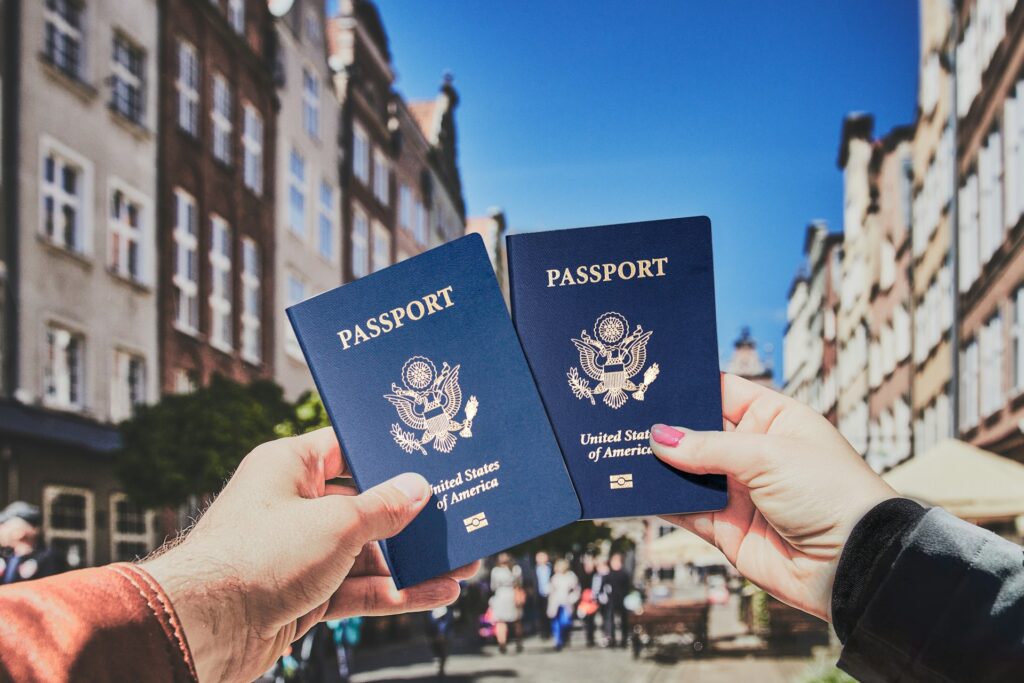Portugal offers one of the most attractive paths to dual citizenship for U.S. citizens — combining lifestyle, opportunity, and global mobility. Whether you’re drawn by the sunny climate, rich culture, or strategic investment options, holding both a U.S. and Portuguese passport opens doors.
In this guide, we’ll walk you through the key routes, legal requirements, and what it really takes to become a dual citizen — all tailored for Americans ready to make Portugal their second home.
What is dual citizenship?
Dual citizenship (also called dual nationality) means you are legally recognized as a citizen of two countries at the same time. You enjoy the rights, privileges, and responsibilities of both — like the ability to live, work, vote, and access healthcare or education in both nations.
For US citizens, this means you can become a Portuguese citizen without giving up your American passport. It’s perfectly legal — and increasingly common among those seeking international freedom, lifestyle upgrades, or global investment opportunities.

Does Portugal allow dual citizenship?
Yes — Portugal fully allows dual citizenship, and that’s a big reason why it’s become such a top choice for Americans looking to live or invest abroad. You can become a Portuguese citizen without giving up your US passport, giving you the best of both worlds: the security and global access of a US passport, along with the benefits of EU citizenship.
Portugal doesn’t require you to renounce your original nationality, and the U.S. also permits dual citizenship. That means you can legally hold both passports, live in either country, and enjoy expanded rights — like easier travel throughout the EU, access to public services in Portugal, and new business or investment opportunities.
Whether you’re applying through residency, marriage, ancestry, or the Golden Visa, dual citizenship is absolutely possible — and increasingly common among American expats.
Can Americans have dual citizenship?
The United States does allow dual citizenship, even though it doesn’t openly encourage it. US law doesn’t require citizens to choose one nationality over another, so you can legally hold a US passport alongside a second one — like Portugal’s.
However, the US government expects dual citizens to follow US laws and obligations, such as filing taxes (even if you live abroad) and, for men, registering for Selective Service if applicable. You won’t lose your US citizenship just by becoming a citizen of another country, unless you voluntarily intend to give it up.
So, as long as your goal is to add Portuguese citizenship — not renounce your American one — you’re fully within your rights to become a dual citizen.

Benefits of Dual Citizenship in Portugal
Holding dual citizenship with Portugal opens up a world of advantages, especially for U.S. citizens looking for lifestyle, financial, or travel flexibility. Here’s what you gain:
1. EU Freedom of Movement
As a Portuguese (and EU) citizen, you’re not limited to Portugal. You gain the right to live, work, study, or retire in any of the 27 European Union countries — from France and Germany to Italy and Spain. You don’t need visas, residence permits, or work authorizations. This freedom is especially valuable for those who want to explore job opportunities, education, or retirement options across Europe.
2. Visa-Free Travel
With a Portuguese passport, you’ll enjoy visa-free or visa-on-arrival access to over 190 countries, including almost all of Europe, the UK, Canada, Australia, and more. That makes it one of the world’s most powerful passports. For frequent travelers, digital nomads, or business professionals, this drastically simplifies global mobility.
3. Access to Public Services
As a Portuguese citizen, you’ll have full access to public healthcare and education systems. Portugal offers universal healthcare at low costs, and its universities are both high-quality and affordable. You also become eligible for scholarships, public programs, and government support — perks not always available to foreign residents.
4. Family Benefits
Dual citizenship makes it much easier to bring your spouse, children, or even parents to live in Portugal. In many cases, your children can also automatically inherit Portuguese citizenship, giving them EU rights from birth. It’s a long-term legacy for your family with access to European education, healthcare, and job markets.
5. Security & Flexibility
Dual citizenship is also a strategic safety net. It gives you legal residency and full rights in two countries — an advantage in times of political unrest, economic shifts, or global uncertainty. Whether you want to relocate, invest abroad, or simply have more lifestyle options, two passports offer flexibility that a single nationality can’t match.

Portugal Dual Citizenship Eligibility
Portuguese Citizenship by Investment (Golden Visa)
The Golden Visa program allows investors to gain residency in Portugal through qualifying investments — such as funds, or cultural support, job creation. After five years of maintaining residency (even with minimal stay requirements), you can apply for Portuguese citizenship. This route is popular for those looking for flexibility and a path to dual citizenship without full-time relocation.
Portuguese Citizenship by Marriage
If you’re married to or in a long-term partnership (recognized as a de facto union) with a Portuguese citizen, you can apply for citizenship after three years of marriage or cohabitation. There’s no residency requirement, but you must prove a strong connection to the Portuguese community — often through language or cultural integration.
Portuguese Citizenship by Naturalization
If you’ve legally resided in Portugal for five years (reduced from the previous six), you’re eligible to apply for citizenship through naturalization. You’ll need to demonstrate basic knowledge of the Portuguese language, have a clean criminal record, and show ties to the country. This is the most common path for expats who move to Portugal to live, work, or retire.
Portuguese Citizenship by Descent
If you have Portuguese parents or grandparents, you may be entitled to citizenship by descent. In many cases, this process is simpler and quicker than naturalization. Documentation proving your family lineage and ties to Portugal is key here — and no residency in Portugal is required.
Portuguese Citizenship by Residency in Former Portuguese Territories
Citizens of certain former Portuguese colonies — like Angola, Mozambique, Cape Verde, Goa, and Macau — may be eligible for Portuguese citizenship, depending on historical connections and legal status. This path applies to those who maintained close ties with Portugal after decolonization.
Portuguese Citizenship by Sephardic Jewish Ancestry
If you can prove descent from Sephardic Jews expelled from Portugal in the 15th century, you may be eligible for citizenship. This route typically requires certification from a recognized Portuguese Jewish community and proof of a family name, language, or traditions connected to Sephardic heritage. Note: As of recent updates, the requirements have tightened, so proper legal guidance is key.

Best Visa Pathways for Americans Seeking Dual Citizenship in Portugal
Portugal D7 Visa
The Portugal D7 Visa, often called the Retirement Visa or Passive Income Visa, was introduced in 2007 to attract non-EU/EEA/Swiss citizens looking to reside in Portugal. It offers a pathway to temporary residency and, eventually, permanent residency or citizenship.
This visa is ideal for retirees or individuals with stable passive income. To qualify, you must have a minimum monthly income of €870, which can come from pensions, rental income, dividends, royalties, intellectual property, or other investments.
In addition, applicants must show they have sufficient funds to support themselves for at least one year in Portugal. This means proving savings of at least €10,440, plus 50% of that amount for a spouse and 30% for each dependent child.
The D7 Visa is initially valid for 2 years, renewable for an additional 3 years. After 5 years of legal residency, you become eligible to apply for permanent residence or Portuguese citizenship, making it a popular route for Americans seeking dual citizenship.
Portugal Digital Nomad Visa
The D8 Visa, also known as the Digital Nomad Visa Portugal, was introduced in October 2022. It allows non-EU/EEA/Swiss citizens with a minimum monthly income of €3,480 to live in Portugal while working remotely.
There are two main pathways under the Digital Nomad Visa:
Temporary Stay Visa
Ideal if you’re not looking to become a resident but want to stay in Portugal longer than the usual tourist period. It’s valid for one year and can be extended for up to two more years. This visa allows multiple entries, so you can travel freely in and out of Portugal, including other European countries.
Residence Visa (Residence Permit Route)
This is the right choice if you plan to stay longer than a year and become a resident. The initial visa is valid for four months, during which you’ll need to apply for a Temporary Residency Permit. Once granted, the permit is valid for two years and can be renewed for another three years.
Portugal Golden Visa
The Portugal Golden Visa, officially known as the Residence Permit by Investment Program, offers residency — and eventually citizenship — to non-EU investors who make a qualifying investment in Portugal. It’s one of Europe’s most popular investment migration programs, offering flexibility and attractive benefits.
Here are the most popular investment options:
Investment Funds – A minimum of €500,000 in private equity, venture capital, or regulated investment funds that focus on Portuguese companies, innovation, or real estate development.
Business Investment & Job Creation – A €500,000 investment in a company that creates at least five jobs for Portuguese citizens.
Scientific or Technological Research – Investing at least €500,000 in research projects related to science, technology, or innovation.
Cultural or Artistic Support – A donation of €250,000 to cultural heritage projects or artistic institutions in Portugal.

Language Test for Portugal dual citizenship
The CIPLE (Certificado Inicial de Português Língua Estrangeira) is the required Portuguese language exam for anyone applying for Portuguese citizenship. It’s an A2-level test, meaning it checks for a basic understanding of the language — just enough to communicate in everyday situations.
If you’re eligible for Portuguese nationality, taking and passing the CIPLE is part of the process.
Here’s what to expect from the exam:
- Oral Comprehension (30%) – 30 minutes
- Reading & Writing (45%) – 90 minutes
- Oral Expression (25%) – 15 minutes
The entire exam takes about 2 hours, and to pass, you’ll need a minimum score of 55%. There’s also a €72 exam fee.
Step-by-Step: Applying for Dual Citizenship in Portugal
Getting dual citizenship in Portugal is a structured process, but with the right guidance, it’s very achievable. Here’s a step-by-step overview:
1. Determine Your Eligibility
You may be eligible through naturalization, marriage, descent (Portuguese parents or grandparents), or Sephardic Jewish ancestry. Each path has its own criteria.
2. Fulfill Residency Requirements
For naturalization, you typically need at least 5 years of legal residence in Portugal. Time under certain visas, like the D7 or Golden Visa, can count toward this.
3. Gather Required Documents
- Valid passport
- Portuguese residence permit
- Criminal background checks (from Portugal and your home country)
- Proof of language proficiency (A2 level in Portuguese)
- Birth certificate and other supporting documents depending on your case
4. Submit Your Application
Applications are submitted to IRN (Instituto dos Registos e Notariado) or through a Portuguese consulate if you’re abroad.
5. Wait for Approval
Processing times can vary but generally range from 6 to 29 months, depending on your citizenship route and the complexity of your case.
6. Obtain Your Citizenship Certificate
Once approved, you’ll receive your Portuguese citizenship certificate. You can then apply for a Portuguese passport.
For more videos about investing or moving to Portugal, explore our YouTube channel here: YouTube Channel Portugal Residency Advisors.
Why chose Portugal Residency Advisors for your Immigration visa
Local Expertise
We know Portugal. Due to our extensive local knowledge, we believe that concentrating our services in a single country destination is the best way to give you the most thorough and useful information.
Holistic Approach
One single channel of communication for the entire process. We provide you with a comprehensive service that covers all aspects of your move, from identifying the ideal residency visa to finding your new home or helping you to settle.
Transparent Service
We recommend what’s best for you based on an extensive process experience that saves time and money to clients. Our pricing is clear and competitive, and we don’t sell services that make us more money.
Simple Process
Technology plays a very important role in our company. We minimize our clients’ involvement in paperwork. We are customers ourselves and we know how to serve you.
Frequently Asked Questions About Portugal Dual Citizenship
Can I have dual citizenship with Portugal and another country?
Yes, Portugal allows dual citizenship. You don’t have to renounce your original nationality to become a Portuguese citizen.
How can I qualify for Portuguese citizenship?
Common routes include residency (after 5 years), marriage to a Portuguese citizen, descent (Portuguese parents or grandparents), or Sephardic Jewish ancestry.
How long does it take to get Portuguese citizenship?
Processing times vary but typically range from 6 to 29 months, depending on your specific case and how complete your application is.
Do I need to speak Portuguese to apply for dual nationality?
Yes, most applicants must pass the CIPLE A2-level Portuguese language exam, which proves basic language proficiency.
Will I lose my US (or other) citizenship if I become Portuguese?
No, the U.S., Canada, UK, and many other countries allow dual citizenship. Always check with your home country’s laws to be sure.
Can I pass Portuguese citizenship to my children?
Yes, in many cases. Once you’re a citizen, your minor children may also be eligible to apply.
Do I need to live in Portugal full-time to apply?
Not always. For citizenship through residency, you must meet the physical presence and legal residency requirements. For descent or marriage, the rules can be more flexible.
Is Portugal dual citizenship permanent?
Yes, once granted, Portuguese citizenship is generally permanent and doesn’t expire — though it can be revoked in rare cases (e.g., fraud).
Do I have to pay taxes in Portugal if I become a citizen?
Only if you are considered a tax resident in Portugal (typically by spending more than 183 days per year there). Dual citizenship alone doesn’t trigger taxation.
Can I apply for a Portuguese passport after getting citizenship?
Yes. Once you’re officially a citizen, you can apply for a Portuguese passport, which gives you full EU mobility rights.




